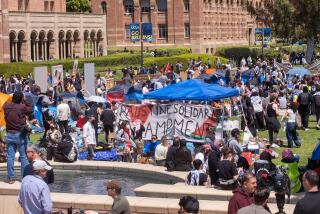CAMPUS CORRESPONDENCE : A Place to Celebrate Black Culture Racially Divides a Campus
- Share via
CHAPEL HILL, N.C. — A revolution. A crusade led by black athletes. A regression to Plessy vs. Ferguson’s “separate but equal.” A social-justice movement. A backlash against multiculturalism and politi cal correctness.
Call it what you will, the debate at the University of North Carolina at Chapel Hill over a proposed free-standing black cultural center has dragged issues of racial equality on campus into the national spotlight--and raised questions about how far an administration’s commitment to achieving racial equality can and should go.
At the heart of the controversy is more than a promise or a movement or even the building itself. To the student coalition fighting for construction of the center, the building would symbolize self-respect and self-determination--proof of the university’s commitment to abolish the vestiges of institutional racism. To the administration, children of the civil-rights movement who believe separate in any sense is inherently unequal, a solitary building is a fortress that can serve no other end but separatism.
The cultural-center issue has been around since the 1970s, when the university’s Board of Trustees agreed to expand the center’s facilities as soon as practical. In 1986, the center’s advisory board and the university architect agreed on a new 23,000-square-foot building to house a gallery, library, performance facilities, office space and multipurpose rooms. Today, the black cultural center remains a small room in the front of the university’s student union, despite the fact that 8% of the campus population is African-American.
Along the way, students have demanded that administrators make good on their promises; university officials have countered with endless compromises and committees. But the tone and mood of the students have fundamentally changed in the past few weeks--from movement to revolution.
Student coalition members have traded a seat at the bargaining table for chants and slogans, rallies and marches, and scathing rhetoric. Hundreds of students joined a spontaneous march on Chancellor Paul Hardin’s home; one demonstration culminated in an ultimatum to Hardin: Take action by Nov. 13. Last month, 7,000 demonstrators turned out for a rally in support of the cultural center; filmmaker Spike Lee and Nation of Islam representative Minister Khalid Mohammed addressed the crowd.
Sadly, this escalation of tensions has served no other purpose than to obscure the real issues. Hidden beneath the screams of “Racist!” “Separatist!” and “No justice, no peace” is the fundamental--and correct--proposition that the university community would benefit from the construction of a new black cultural center on campus. As a place where the study and appreciation of African-American culture could be promoted, the center would attract exhibitions, lectures and performances, benefiting student and community. It would help to balance the unmistakably Eurocentric slant of traditional curricula.
Critics who cry this approach panders to minority interests or smacks of political correctness miss the point. African-American culture is an integral part of America’s cultural identity. Celebrating its achievements is not to denigrate or ignore others. Nor does it mean that non-minority students would be left out. All students would benefit from a library devoted to the black experience. And holding classes in the center would ensure that a broad cross-section of the campus population would daily pass through it.
Ironically, the building’s future site and funding, thanks to alumnus Michael Jordan’s “Jordan Foundation,” are not in dispute. No state or university money would be required.
In a sense, supporters of the center are right--the struggle is about more than just a building. It speaks to the commitment of our universities to paying more than lip service to advancing race relations in the United States. Far from being a campus talisman, a black cultural center would contribute to racial harmony and understanding on campus and in the larger community. And that is an idea whose time has come.
More to Read
Sign up for Essential California
The most important California stories and recommendations in your inbox every morning.
You may occasionally receive promotional content from the Los Angeles Times.










